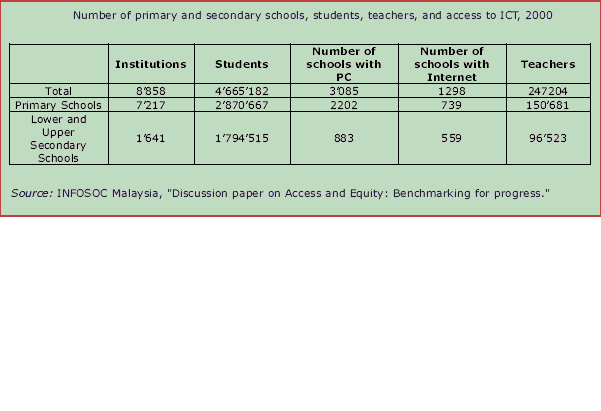Networked Learning
School's Access to ICTs The Ministry of Education had US$ 3.4 billion budgeted, which represents some 20 per cent of the total government spending. This shows a strong commitment by the government towards enhancing education.

Looking at the above chart, there is an uneven distribution of technology or a digital divide must be explained between student in urban school that have access to the internet and those in rural school that for the most part do not. It is estimated that 12% of the school do not have access to a phone line in the rural areas. The Ministry of Education has flagged one third of its budget to connect 230 rural schools to the internet in the hear future. According to the plan, 120 will be connected with ISDN lines, 100 with PSTN lines and ten with a VSAT connection. It is also estimated that about 250 schools, primary as well as secondary have their own web sites; some with rich multimedia.
Enhancing Education with ICTs - To support educational enhancement, starting in the 1990s, all teachers are obliged to take basic informatics courses in teachers' college and the Ministry of Education also offers intensive courses during the weekends and holidays for those who want to develop their IT skills.
Developing the ICT Workforce - There are several universities in Malaysia that offer distance learning. The University Tun Abdul Razak, a virtual university, UNITAR offers online courses in many subjects including information technology and business. Bachelors, Masters and Doctorate degrees are offered. UNITAR received its first 162 students in 1998 and the number had grown to about 7,000 students in November of 2001. It offers a combination of teaching methods, including face-to-face, online and multimedia. At the end of 1998, Malaysia had some 87,000 ICT workers of which about 10% were software engineers. It was estimated that an additional 85,000 ICT workers would be needed by 2005. This had caused the government to increase efforts, as well as, organizations in the private sector to raise the number of skilled workers. In 2000, some 65,000 students were taking ICT courses at institutes of higher learning in Malaysia. Another 750 people participated in IT related courses at one of the country's 20 Industrial Training Institutes (ITI). In-house training is one of the ways the government tries to cope with the lack of ICT experts. Specialized courses on web page design and other ICT applications are provided in various departments and agencies. A variety of training projects were launched by both the government and the business sector to develop ICT skills.